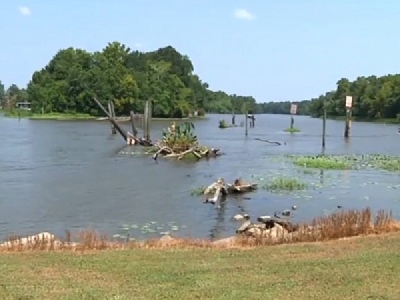
Posted on June 4, 2018
By Malary Pullen, WBRZ
For decades, parishes have gone back and forth about cleaning and dredging the Amite River. It runs through three major parishes in our area, but this issue goes all the way back to the 1950s.
The Amite River stretches about 117 miles and touches three major parishes in our area, East Baton Rouge, Livingston and Ascension. For decades, residents and experts have said it needs to be cleared.
“It was somewhat of a unique agreement back in 1955 when Congress passed legislation to provide for dredging on the Amite and Comite Rivers. And it required that the parishes come in to provide an agreement to maintain and upkeep the rivers,” says Congressman Garret Graves, who has worked for years trying to get funding for waterways like the Amite.
It’s an agreement that goes back more than 60 years. It lays out responsibility to the three parishes. It states that the U.S. Army Corps of Engineers would snag and clear the river for flood control and improving drainage. After that, the responsibility would fall to the parishes to maintain the river. It was laid out in resolutions from 1956 and signed by the East Baton Rouge and Livingston Parish presidents.
“And they had passed a resolution and agreed to maintain these channels. Ascension parish was another area,” Graves added. “But has that actually happened? Well, yes and no. Has there been some maintenance on the rivers? To some degree.”
However, the last time any type of major work was done on the Amite River was in the 1960s. Since then, southeast Louisiana has gone through the flood of 1983, numerous hurricanes and, of course, the Great Flood of 2016.
“There are huge problems. One: Was it properly dredged and cleaned out after Hurricane Gustav? No. Has it been cleaned out and properly dredged after the 2016 flood? No,” Graves continued.
The congressman says some work could have been done to alleviate some of the flood waters, but people should keep in mind it was a thousand-year flood.
We reached out to the current parish presidents of EBR, Ascension and Livingston and only one responded, agreeing to do an interview.
“I was actually just made aware of that agreement. I think it was in 1956. Certainly, I wasn’t here then,” said Livingston Parish President, Layton Ricks. “And the good news is we’re focused on doing some work on the Amite River, as you know, through restoration funds and hazard mitigation grant dollars.”
When it comes to the biggest hold up with any type of waterway project Ricks admits it’s funding.
“We just provided about $112 million to Livingston Parish for them to directly control and to use on cleaning out canals and dredging. They’re working on that plan right now,” Congressman Graves said. “Those dollars are available. Number two, we’re working with the Parishes to get FEMA to come in and pay for some of the sediment that’s in there as a result of some of those disasters. Number three, and this is really an anchor of it, is getting that Comite project built… Because that pulls water off of the Comite River, which drains into the Amite River and provides more [drainage] capacity overall.”
With the money there, it’s now down to getting past the red tape with FEMA and the U.S. Army Corps of Engineers.
“Plans have been submitted as far as the restoration funds that he’s talking about and those funds are in the place. And those plans have been submitted. Once it’s approved, after its permitted, the engineering work will start. And that should happen relatively soon. That’s already been submitted,” Ricks said.
As the hurricane season ticks closer, and one named storm is already in the books, Ricks says he hopes to see some type of maintenance start within the year on the Amite.
“To be able to finally see where we can get to work on the Amite River, which is certainly all the way from Watson, all the way down from Port Vincent, French Settlement and on further south, will be a major step in helping us with flooding,” the parish president added.
At this time, it’s still unclear if there could be any legal ramifications for the parishes’ failure to comply with the more than 60-year-old agreement. We asked the Corps of Engineers to do an interview with us as well, but our request went unanswered.
Source: WBRZ





